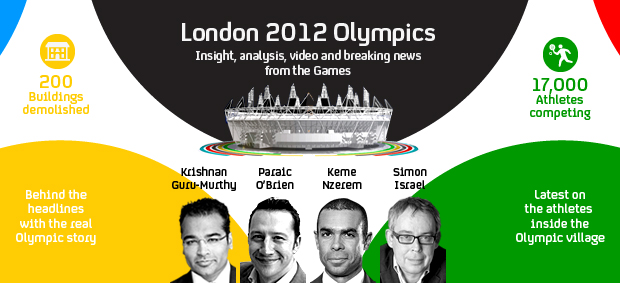Torch fires British passion for the Games
As the Olympic torch nears its final lap, communities that welcomed it tell Channel 4 News it has drawn them closer to the event. But writer Iain Sinclair calls the Games a “national hallucination”.
After 70 days and 8,000 miles covering the length and breadth of Britain and Ireland, the Olympic torch relay ends its UK leg at the Olympic stadium on Friday.
But as the as yet unnamed torchbearer prepares to light the Olympic flame, has the Olympics kindled a fire in the hearts of the British public?
Novelist and Olympic cynic Iain Sinclair is not convinced. He told Channel 4 News it is a “wonderful national hallucination”.
“It’s a bit of beautiful conjuring between William Burroughs and Charles Saatchi – the combination of paranoia and advertising run wild,” he added.
WN Herbert, professor of poetry and creative writing at the University of Newcastle, has also been underwhelmed by the torch itself – or the “Blazing Grater” – when it came to Tyneside. He penned a poem inspired by the torch saying that it “skipped the Scotswood Road, and poverty and trouble – it’s looking like a monkey show performed inside a bubble”.
Diverse welcome
But elsewhere, the reception has been more positive.
A community organiser in London said the Games have been welcomed in the largely-Bangladeshi neighbourhoods around the Olympic Stadium, but he adds that this is partly down to years of hard work between Games organisers and the community to provide a legacy for local people.
Neil Jameson, the national director of Citizens UK, said the torch relay event in Stepney, east London attracted a very diverse crowd. “The torch pulled people out from every different community,” he revealed. “There was a great feeling of energy and solidarity.”
Mr Jameson said there is a positive feeling about the Olympics amongst ordinary Londoners, “not in a sentimental way” but because organisers had honoured a deal struck in 2004 to bring jobs at a living wage to London and training in construction.
If that deal had not been honoured, people would be less positive about the games, Mr Jameson said. “If that had happened, I am afraid I would have been one of those people who would be cynical about them,” he revealed.
Can an athlete’s hometown determine sporting success? Check out our interactive maps to find out.
Diminishing benefits
Further north, the Games have also been greeted enthusiastically, despite the diminishing benefits they bring communities outside London.
Azizzum Akhtar, chief executive of Rotherham Ethnic Minority Alliance, said the torch relay and sports events organised to coincide with it in Rotherham generated “involvement and engagement” in the town. “A civic-type event will often get a good crowd here,” he said.
Mr Akhtar, who has tickets to see the semi-finals of the football at Old Trafford in Manchester, said people outside of London are at an advantage because they do not have the hassle of having the Games on their doorstep.
“We just get the benefits,” he said. “Let’s face it, the games are never going to be in Rotherham.”
Electric atmosphere
Further north still, Angela Darling, a co-chair of the torch relay in the tiny village of Bamburgh in Northumberland – located within 25 miles of the Scottish border – said the torch relay attracted 7,000 visitors to the village in June.
Events in the village included a scarecrow competition, an auction, and an exhibition of past Olympic torches involving the Montreal Olympics 10,000m bronze medallist Brendan Foster.
“The atmosphere was electric,” she reveals. “There were so many communities coming together.”
“It was a great idea to bring the Olympic torch to small villages,” she continued. “I am certainly more excited about the Olympics because of this.”
The Northumberland former mining town of Bedlington is preparing to host an event marking the Olympic opening ceremony. The town has also featured prominantly in media coverage of the torch relay with a parade involving 30 Bedlington terrier dogs.
On the Olympic map
Down in Norfolk, the village of Hethersett sought to put itself on the Olympic map after disappointment that none of the national Olympic teams would be setting up training camps in the county.
The village organised its own torch relay last year featuring the 1948 Olympic torch, hosted a series of local sporting events and produced its own commerative coin.
Hethersett hopes to achieve a lasting legacy of better sports facilities and greater participation in sport.
Hethersett parish councillor, Shane Hull, said: “As a parish council we embraced the idea that the Olympics were coming to Britain, even though we were more than 100 miles away from London.”
Hethersett was rewarded by its efforts when the torch made the first deviation from the official route in the history of the relay to be presented to the local school.
Taiba Yasseen, a community engagement consultant, praised the torch relay organisers for making it as inclusive as possible by using ordinary members of the public as torchbearers and routing it through so many communities.
“When I was near it or someone passed by with it, the Olympics became more real,” she said.
“As a country, we do not have enough events that pull is together and gives us that shared experience. This year we have had many and they definitely bring a sense of pride.”
-
Latest news
-
Taylor Swift’s new break-up album breaks records3m

-
NHS trust fined £200K for failings that led to death of two mental health patients3m

-
Sunak vows to end UK ‘sick note culture’ with benefit reform3m

-
‘Loose talk about using nuclear weapons is irresponsible and unacceptable’, says head of UN’s nuclear watchdog3m

-
‘There wasn’t an Israeli attack on Iran,’ says former adviser to Iran’s nuclear negotiations team7m

-





